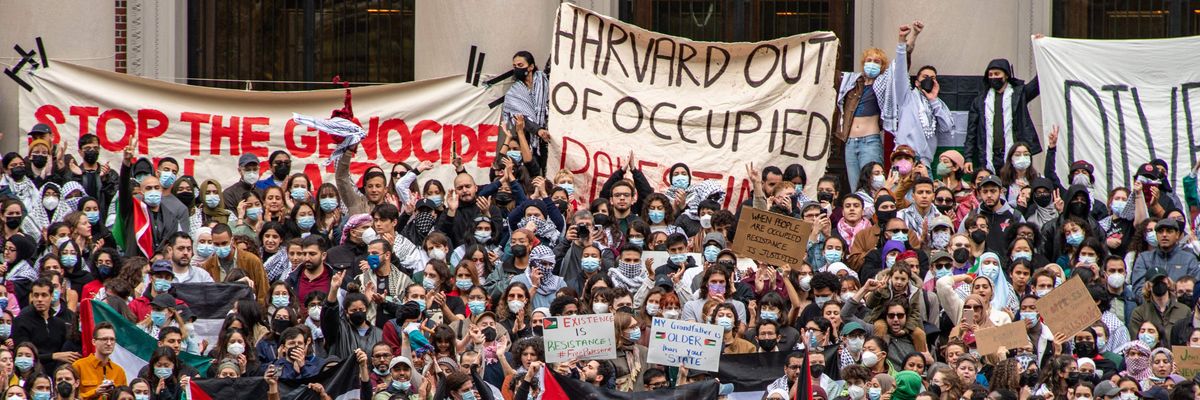"For the safety of Jews and Palestinians, stop weaponizing antisemitism."
That's the headline of a Friday
op-ed from Bernie Steinberg, who was the executive director of Harvard Hillel from 1993 to 2010.
Harvard University is
among many U.S. higher education institutions—including Brandeis University, Columbia University, Massachusetts Institute of Technology (MIT), University of Florida, and University of Pennsylvania (Penn)—embroiled in a battle over antisemitism amid what a growing number of world leaders and legal scholars call Israel's "genocidal" war on the Gaza Strip.
Even before the Hamas-led attack on Israel 12 weeks ago sparked a
U.S.-backed retaliatory war in which Israeli forces have killed more than 21,670 people in Gaza, including over 8,200 children, members and supporters of the Israeli government have used bad-faith claims of discrimination, hostility, or prejudice against Jews to defend policies and practices that have oppressed Palestinians for decades.
Since October 7, reports of
antisemitism and Islamaphobia have soared. There have also been heightened efforts to conflate antisemitism and legitimate criticism of Israel, with U.S. critics facing shuttered campus groups, lost jobs, congressional resolutions, and other consequences for daring to condemn the mass killing of Palestinian civilians.
Recalling his own experiences enduring antisemitism, including violent attacks, Steinberg wrote for a new Harvard Crimson opinion series:
As a leader in the Jewish community, I am particularly alarmed by today's McCarthyist tactic of manufacturing an antisemitism scare, which, in effect, turns the very real issue of Jewish safety into a pawn in a cynical political game to cover for Israel's deeply unpopular policies with regard to Palestine. (A
recent poll found that 66% of all U.S. voters and 80% of Democratic voters desire an end to Israel's current war, for instance.)
What makes this trend particularly disturbing is the power differential: Billionaire donors and the politically connected, non-Jews and Jews alike on one side, targeting disproportionately people of vulnerable populations on the other, including students, untenured faculty, persons of color, Muslims, and, especially, Palestinian activists.
"In most cases, it takes the form of
bullying pro-Palestine organizers. In others, these campaigns persecute anyone who simply doesn't show due deference to the bullies," Steinberg wrote of current trends on campuses. He noted the effort to smear Harvard's new president and warned that "the toppling of the president of the University of Pennsylvania is a sobering example of what can happen when we empower these unscrupulous forces to dictate our path as university leaders."
Founded a century ago, Hillel International
calls itself "the world's largest and most inclusive Jewish campus organization," operating at 850 campuses in 16 countries. The ex-Hillel leader wrote to Jews at Harvard that "I know that it's alienating and hurtful to so many of you when campus Jewish organizations, like Hillel and Chabad, take positions that exclude your voices. To those students, I say: The Jewish tradition is much deeper than any organization. No one has a monopoly on Judaism."
Steinberg, who lived in Jerusalem for 13 years, urged Harvard's Jewish students to "continue to learn Torah, Jewish history, and our ethical traditions," and to "be boldly critical of Israel—not despite being Jewish, but because you are."
"I know what antisemitism looks like and I do not take the issue of violence against Jews lightly. I have monitored, with vigilance, the kinds of speech that Israel-aligned parties are calling 'antisemitic,' and it simply does not pass the sniff test," he argued. "Let me speak plainly: It is not antisemitic to demand justice for all Palestinians living in their ancestral lands."
"The activists who employ this language, and the politics of liberation, are sincere people; their cause is a legitimate and important movement dissenting against the brutal treatment of Palestinians that has been ongoing for 75 years," he stressed. "One can disagree with any part of what these activists say, but they must be allowed to speak safely and afforded the respect their morally serious position deserves."
Steinberg added that "it is very telling that some of Israel's own supporters instead go to extraordinary lengths to utterly silence the other side. Smearing one's opponents is rarely a tactic employed by those confident that justice is on their side."
"Antisemitism in the U.S. is a real and dangerous phenomenon, most pressingly from the alt-right white supremacist politics that have become alarmingly mainstream since 2016," he asserted. "To contend against these and other antisemitic forces with clarity and purpose, we must put aside all fabricated and weaponized charges of 'antisemitism' that serve to silence criticism of Israeli policy and its sponsors in the U.S."
Steinberg's op-ed was praised on social media as a "powerful," "deeply considered," "cogent," "must-read piece."
Rebecca Vilkomerson, a former Jewish Voice for Peace executive director now at Funding Freedom,
said Saturday that "as someone who has felt disappointed and betrayed by mainstream Jewish institutions, including Hillel, for well over a decade (and yet plunged into an even deeper depression and rage by their response to genocide in Gaza), I felt deeply moved by this piece."

